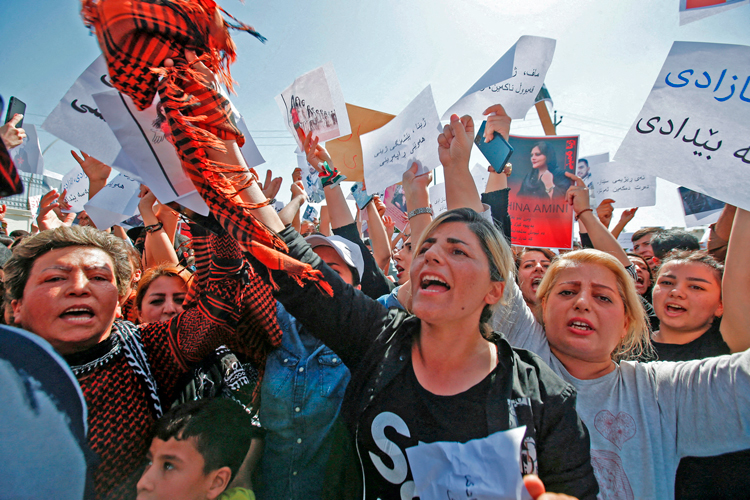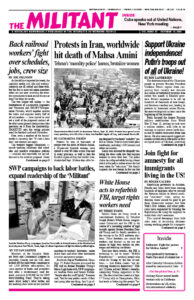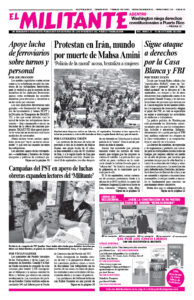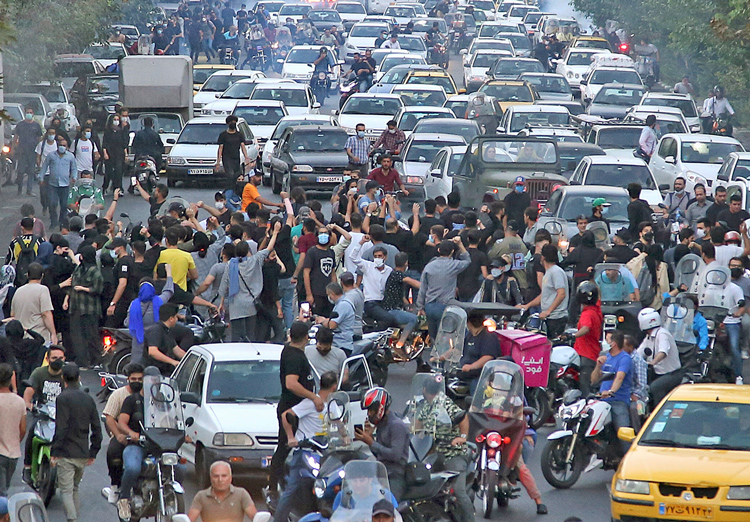Protests by tens of thousands of people over the death of Mahsa Amini, a 22-year-old Kurdish woman, have spread to over 80 cities across Iran and to every province, as well as into the Kurdish region of Iraq that borders Iran. Amini died Sept. 16 three days after being detained by the hated “morality” police in Tehran. Protests have taken place worldwide, including 1,000 Iranians and others in London.
Amini was arrested for allegedly violating the dress code law that requires women to cover their hair. The police claim she collapsed while having a heart attack at the police station where she had been taken for “education.” Her family suspects she was beaten in the van that transported her there.
On Sept. 24 several hundred people protested outside the U.N. office in Erbil, the capital of the Kurdish Regional Government in northern Iraq. They chanted in Kurdish, “Women, life, freedom!” Some participants were from the Kurdish region of Iran, visiting relatives or looking for better paid jobs on the Iraqi side of the border.

“Many of my friends were there,” Kanyaw Ebubekir told the Militant by phone from Sulaimaniyah, also in the Kurdish region of Iraq. “We call Mahsa, ‘Zhina,’ her Kurdish name. Zhina means ‘life.’ It’s important that her Kurdish identity is known, not just the Persian name she must have in her passport.”
Azad Husseini, a carpenter from Baneh, Iran, who was in Erbil to work, told Rudaw news agency that Amini’s death had released anger that had been building up for a while. “The difficult economic situation,” he said, “the repression of freedoms, particularly those of women, and the rights of the Iranian people led to an implosion.”
Also fueling the protests is widespread discontent over the bourgeois clerical regime’s military adventures across Iraq, Syria, Yemen, Lebanon and beyond. Working people are tired of the body bags, funerals and sacrifice these operations impose on them.
“I just came from a meeting today,” Bahar Munzir told the Militant. “Women activists and others from different organizations are calling for another demonstration Sept. 28 in central Sulaimaniyah.”
Outrage over Amini’s death was so deep that Iranian President Ebrahim Raisi called the family and promised there would be an investigation. But as the protests spread, the police and the Basij, a paramilitary force under the control of the Revolutionary Guard Corps, attacked protesters with tear gas, truncheons, water cannons and increasingly with live ammunition.
Tehran threatens ‘decisive strike’
The regime now claims the protests are “riots” organized by foreign agents and terrorists. Raisi threatened a “decisive strike on the disrupters of security and peace of the country.”
The protests and strikes by workers have been especially strong in the Kurdish region of Iran, where the widespread hatred for the morality police is intertwined with the struggle against the national oppression of the Kurdish people.
“In Shno [Oshnavieh] the people drove out the soldiers,” said Ebubekir. “They were marching on the streets all night.” Oshnavieh is a Kurdish town in Iran near the Iraqi border. The following day government forces retook control of the town.
Iranian high school students called for a nationwide boycott of classes Sept. 26, supported by the Coordinating Council of Iranian Teachers Trade Unions. Women secondary school students called on male students to join them.
The Islamic Students Association at Tehran University charged that the government is applying “heretical violence and cruelty to women, which is unprecedented even in the Middle Ages.” They called the laws imposing a dress code on women “a heresy that is neither religion, nor custom, nor ethics nor honor, nor even contained” in the regime’s “own written laws.”
Hundreds of people have been arrested across the country — including two leaders of the Islamic Students Association in Tehran — and more than 40 had been killed by the repressive forces as of Sept. 26.
“The repression must be stopped immediately,” said a statement from the bus drivers union in Tehran. “All the detainees should be released immediately and unconditionally. Protests, strikes and lawsuits are the indisputable rights of the people.”


